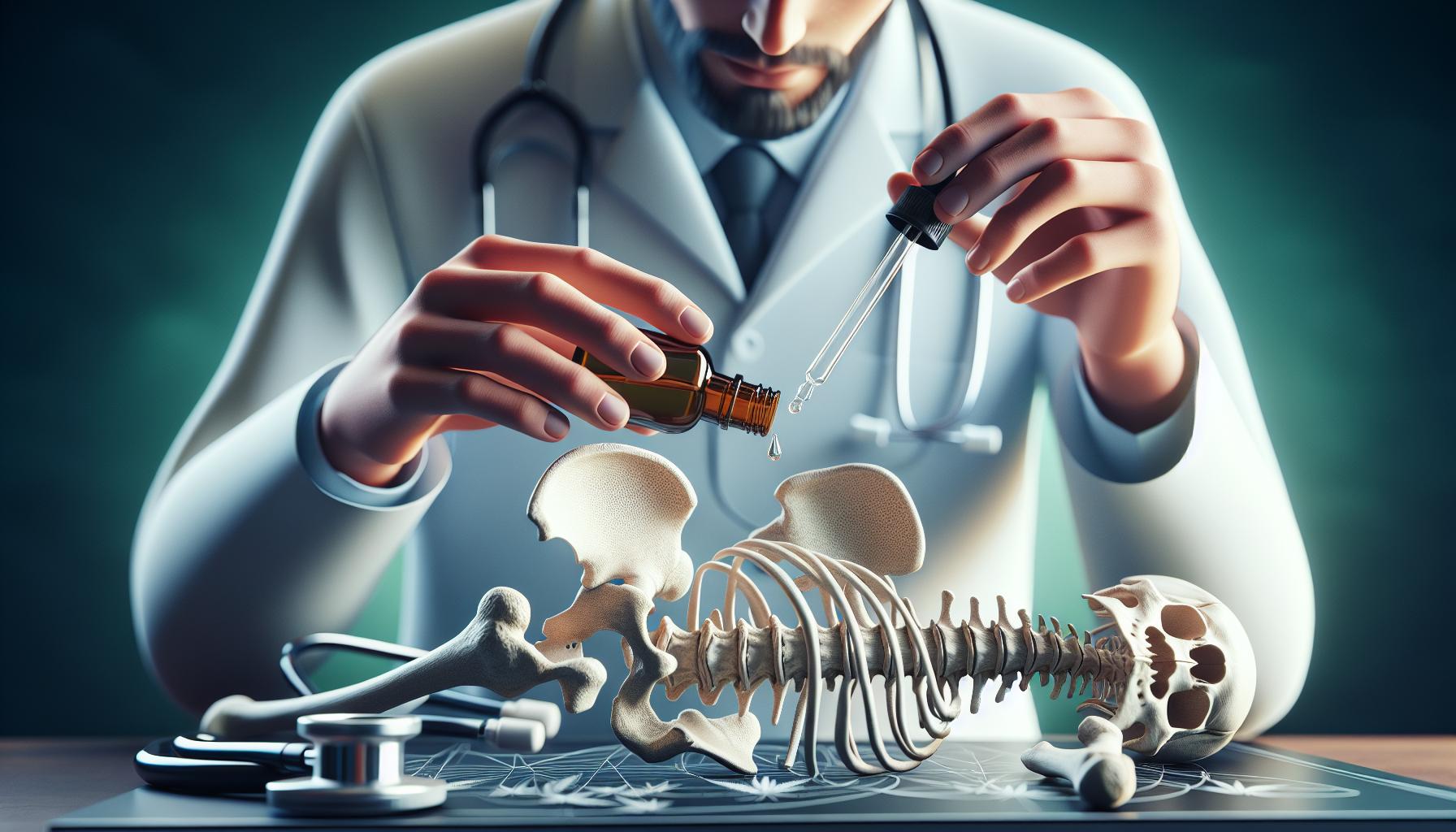CBD’s Role in Bone Health: Enhancing Strength and Healing
CBD, or cannabidiol, is making waves in the wellness community, not just for its calming effects but also for its potential in enhancing bone health and healing. As research delves deeper, it’s becoming clear that CBD could be a game-changer for those looking to support their skeletal system.
With its anti-inflammatory properties and ability to promote cell repair, CBD is showing promise in aiding recovery from fractures and even in strengthening bones. It’s an exciting time for both healthcare professionals and patients as they explore the benefits of incorporating CBD into their bone health regimen.
Key Takeaways
- CBD demonstrates promising potential in enhancing bone health and healing by engaging with the body’s endocannabinoid system, promoting bone metabolism, and stimulating the formation of new bone tissue.
- Its anti-inflammatory properties play a crucial role in its effectiveness, potentially reducing inflammation and thus contributing to a healthier environment for bone recovery and growth.
- CBD has been shown to accelerate the healing process of fractures and strengthen bones post-recovery by influencing the activity of osteoblasts and osteoclasts, key cells in bone formation and resorption.
- Beyond aiding in recovery, CBD’s analgesic properties provide pain relief associated with bone injuries and conditions, offering a dual benefit in the treatment process.
- While the existing research points to a positive impact of CBD on bone health, ongoing studies are crucial to fully understand its benefits and implement it effectively alongside traditional treatments.
- Individuals considering CBD for bone health or recovery should consult healthcare professionals to determine the most appropriate and safe approach for their specific needs.
Understanding CBD’s Impact on Bone Health
CBD, a natural compound found in the cannabis plant, is making waves in the wellness industry for its potential to enhance bone health and aid in healing. Recent studies show that CBD could be a key player in bone regeneration and health, offering a beacon of hope for those seeking alternative treatments. It’s important to delve into how CBD interacts with the body to promote better bone health.
Firstly, CBD works by interacting with the body’s endocannabinoid system (ECS), which plays a crucial role in regulating various physiological processes, including those related to bone health. The ECS helps maintain balance within the body, and CBD’s influence on this system can lead to positive outcomes for bone repair and growth. Research suggests that CBD can support the process of bone metabolism—a vital aspect of maintaining strong and healthy bones. This involves the removal of old bone material and the deposition of new, which is crucial for healing fractures and preventing bone diseases.
Moreover, CBD’s anti-inflammatory properties are of significant interest to those studying its effects on bone health. Inflammation is a natural response to injury or disease, but chronic inflammation can lead to significant health issues, including those affecting the bones. By potentially reducing inflammation, CBD can indirectly protect bone health and enhance the body’s ability to heal from injuries.
Emerging evidence also points to CBD’s ability to stimulate the growth of new bone tissue, a process known as osteogenesis. This is particularly promising for individuals recovering from fractures, as it could speed up the healing process. Additionally, CBD’s analgesic properties can provide relief from pain, which is often a byproduct of bone injuries or conditions. This dual action of promoting healing while providing pain relief makes CBD a compelling option for those looking to improve their bone health.
While more research is needed to fully understand the extent of CBD’s benefits for bone health, the current findings are promising. Individuals interested in exploring CBD as a supplementary treatment for bone conditions should consult with healthcare professionals to determine the best approach for their needs.
Exploring the Anti-Inflammatory Properties of CBD
Cannabidiol, commonly known as CBD, has emerged as a significant player in the wellness industry. Its anti-inflammatory properties are central to its ability to enhance bone health and healing. Inflammation is a natural response to injury or disease; however, chronic inflammation can hinder the body’s healing processes, including those related to bone health. CBD’s interaction with the body’s endocannabinoid system plays a pivotal role in modulating this response.
Research has demonstrated that CBD can inhibit the release of pro-inflammatory cytokines, which are small proteins that play a crucial role in initiating and perpetuating inflammation. By reducing these proteins’ levels, CBD helps to alleviate inflammation, thereby creating a more favourable environment for bone healing and regeneration.
Moreover, CBD is known for its ability to interact with CB2 receptors, found primarily in the immune system. This interaction aids in reducing inflammation without inducing psychoactive effects, making CBD a compelling option for individuals seeking natural methods to support bone health.
| Source | Finding |
|---|---|
| Experimental studies | CBD reduced inflammation in animal models of arthritis |
| Clinical trials | Patients reported reduced pain and inflammation with CBD treatment |
These findings underpin the potential of CBD as a therapeutic agent not only for enhancing bone health but also for addressing conditions characterised by chronic inflammation. The natural properties of CBD, combined with its lack of psychoactive effects, positions it as an appealing choice for those looking to support their body’s healing mechanisms in a holistic manner.
The anti-inflammatory properties of CBD are a cornerstone of its potential to aid in bone health and healing. Its natural interaction with the body’s systems, coupled with supportive research findings, underscores the promising role CBD could play in health and wellness, particularly for those keen on exploring natural therapeutic options.
The Role of CBD in Cell Repair and Regeneration
CBD’s impact on cell repair and regeneration is a testament to its potential in the realm of health and wellness, particularly in enhancing bone health. Its benefits go beyond mere pain relief, as research indicates that CBD is instrumental in promoting cell growth and recovery. This is crucial for individuals recovering from injuries or suffering from bone-related conditions.
One of the key ways CBD contributes to cell regeneration is by modulating the body’s endocannabinoid system. This system plays a vital role in maintaining homeostasis, including the regulation of cell life cycles. CBD’s interaction with this system can encourage the formation of new bone cells, an essential aspect of bone health and healing.
Moreover, CBD’s anti-inflammatory properties are invaluable in the cell repair process. Inflammation can often hinder the body’s ability to heal effectively. By reducing inflammation, CBD facilitates a more conducive environment for cell repair and regeneration. This not only accelerates recovery but also helps in mitigating pain and discomfort during the process.
Studies have shown that CBD also influences the activity of osteoblasts and osteoclasts, which are the cells responsible for bone formation and resorption, respectively. This influence supports the remodeling of bone and aids in the healing of fractures and other bone-related issues. The capacity of CBD to balance these activities presents a natural alternative for enhancing bone density and strength.
Furthermore, CBD’s antioxidative properties offer additional support to cell health. By combating oxidative stress, CBD shields cells from damage and supports their vitality. This protective mechanism is crucial for maintaining the longevity and functionality of cells, which directly contributes to the body’s overall regenerative capabilities.
Research continues to explore the full extent of CBD’s role in cell repair and regeneration. With each study, CBD’s potential as a supportive agent in promoting bone health and facilitating healing becomes increasingly evident. As the body of evidence grows, so does the understanding of how CBD can be harnessed to support the body’s natural healing processes.
CBD’s Potential in Fracture Recovery
CBD has shown considerable promise in aiding fracture recovery, with its unique properties enhancing the body’s natural healing process. Research highlights CBD’s ability to speed up the healing of broken bones, making it a noteworthy addition to the recovery regimen. By influencing the activity of osteoblasts and osteoclasts – the cells responsible for new bone formation and old bone resorption, respectively – CBD plays a pivotal role in the critical balance needed for optimal bone health and recovery.
A study published in the Journal of Bone and Mineral Research revealed that rats with mid-femoral fractures experienced faster healing when treated with CBD. The key findings were not only the rapid recovery of fractures but also the strengthening of the bone during the healing process, suggesting that CBD-treated bones may be less likely to break in the future. These results open up new avenues for CBD in preventative bone health measures as well as therapeutic applications in bone recovery.
CBD’s anti-inflammatory properties contribute significantly to its effectiveness in fracture recovery. Inflammation is a natural response to injury, including fractures, but when excessive, it can impede healing. CBD helps by mitigating inflammation, thereby easing pain and reducing swelling. This not only makes the recovery process more comfortable but may also speed it up.
Research emphasises CBD’s role in cell regeneration. By promoting the growth of new cells and protecting them from oxidative stress, CBD ensures that the healing process is not only swift but also comprehensive. This aspect of CBD is particularly beneficial in bone healing, where new cell formation is crucial.
Moreover, CBD’s interaction with the body’s endocannabinoid system offers a holistic approach to healing. This interaction helps in regulating pain and inflammation, key factors in the recovery process. By enhancing the body’s innate healing mechanisms, CBD supports overall wellness, making it a valuable ally in fracture recovery.
In light of these findings, CBD emerges as a potent natural remedy in the realm of bone health and recovery. Its ability to facilitate healing, reduce pain, and potentially prevent future fractures provides a compelling rationale for its use in therapeutic settings. As ongoing research continues to shed light on CBD’s myriad health benefits, its role in supporting bone health and recovery is increasingly recognized and appreciated.
Conclusion
CBD’s role in bone health is undeniably significant with its multifaceted approach to strengthening bones, reducing inflammation, and speeding up the healing process. Its ability to stimulate osteoblast activity while inhibiting osteoclasts offers a promising natural solution for those looking to enhance bone formation and prevent bone loss. Additionally, its anti-inflammatory properties provide much-needed relief during recovery periods, making it a valuable ally in the fight against bone-related conditions and injuries. With CBD, individuals have a powerful tool at their disposal for maintaining and improving bone strength, marking a leap forward in natural health remedies.


Leave a Reply